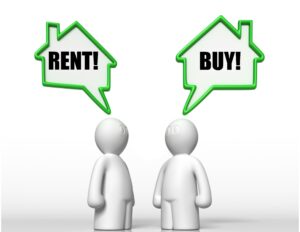 A home purchase can be very emotional and personal decision, so you should weigh the advantages and disadvantages before you take the plunge. Some of the key advantages to ownership are the ability to fix the monthly costs with a mortgage, the potential to accumulate equity over time, typically larger space than a rental, personalization of the property and tax benefits.
A home purchase can be very emotional and personal decision, so you should weigh the advantages and disadvantages before you take the plunge. Some of the key advantages to ownership are the ability to fix the monthly costs with a mortgage, the potential to accumulate equity over time, typically larger space than a rental, personalization of the property and tax benefits.
Some of the key disadvantages are the lack of mobility, initial costs can be substantial (down payment, closing, title, landing fees, insurance, escrow, etc.), maintenance, payments are usually higher than renting and the future selling costs. Be sure your decision makes sense as it pertains to your short, mid and long-term financial plans.
It is imperative that you assume a loan you plan to keep for the long term. That is easier today because there are fewer choices and far stricter requirements placed upon you. Probably your bigger issue surrounds your long-term desires to stay in the area and your ability to switch jobs at the same pay level if you need to or are forced to do so.
Responsibilities and Liabilities
Homeownership comes with large responsibilities and liabilities. So it is important that you have the proper insurances in place to protect your two greatest assets: you and your home. When assuming a loan, the lender will require you to maintain appropriate amounts of property and liability insurance. However, they don’t require you to maintain adequate amounts of life, disability, health and long-term care coverage. Your future “earning” potential may be your greatest asset for yourself and your family. You should make sure you have ample coverage on yourself to fund your responsibilities.
Tax Considerations
Home ownership can be a great way to reduce your taxable income through mortgage and property tax deductions. However, we often see people trigger alternative minimum tax (AMT) when their property taxes are an adjustment item, especially for our Miami clients. When it comes to homeownership, tax benefits may help, but they should not be the single deciding factor in the decision.
When buying a home, particularly if you are a first-time home buyer, it is easy to be overwhelmed with emotion. However, it is important to not allow your emotions override your needs. We strongly recommend that you maintain at least three to six months of expenses in the bank as liquid emergency reserves. Owning a home can be costly, having an emergency savings fund in case of unexpected maintenance or other home-related expenses is imperative. We also encourage you to buy the level of the home that will also allow you to continue to save for retirement, fund your IRA/401(k) and to create assets that are not solely dedicated to your residence.
At the end of the day, your house is your home, a place where you live. You want it to become an investment only when you have alternatives. You don’t want to get caught in a situation where your home has to be an investment for your future. It should be the last asset you ever need to touch.

Leave a Reply